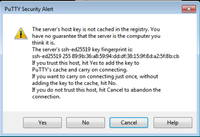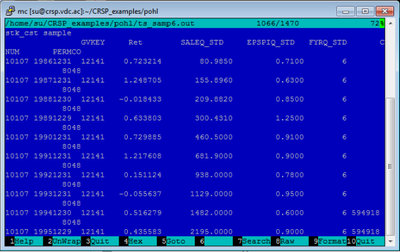CRSP
(→SSH) |
(→VPN) |
||
| Line 16: | Line 16: | ||
==== VPN ==== | ==== VPN ==== | ||
| − | If working from home or | + | If working from home or elsewhere but from the institute's PC lab (room #6.644) you have to establish a Virtual Private Network (VPN) to Uni first ([https://zid.univie.ac.at/en/vpn/ see ZID/VPN]). |
==== SSH ==== | ==== SSH ==== | ||
Revision as of 12:39, 23 October 2019
Contents |
1 CRSP, COMPUSTAT, CCM
1.1 access
1.1.1 require credentials
email the VDC sysadmin to provide credentials and prepare your remote terminal
- host: crsp.vdc.univie.ac.at
- user: your username
- password: your password
1.1.2 VPN
If working from home or elsewhere but from the institute's PC lab (room #6.644) you have to establish a Virtual Private Network (VPN) to Uni first (see ZID/VPN).
1.1.3 SSH
If working from Windows, you might need to install an SSH-client (like PUTTY) to use Secure Shell (SSH) to connect to your terminal. Accept the server key.
1.1.4 usage of a terminal
Now you work remotely and use the remote host's command line (which is the bash shell, don't type the beginning "$", which is the prompt):
the midnight-commander (mc) provides a built-in editor mcedit (exit it with Alt+0)
$ mc
$ mcedit ts_samp7.rqt
e.g. use "ts_print" to process a requirementfile "ts_samp7.rqt" and get the output "ts_samp7.out":
$ ts_print ts_samp7.rqt
use mc/mcedit to look into ts_samp7.out with:
$ mcedit ts_samp7.out
1.2 documentation
Please read some manuals to gain experience with the ts_sampleX.rqt files in your home directory CRSP Utilities and Program Libraries (CUPL) and maybe the xf-understanding_the_data guide.


